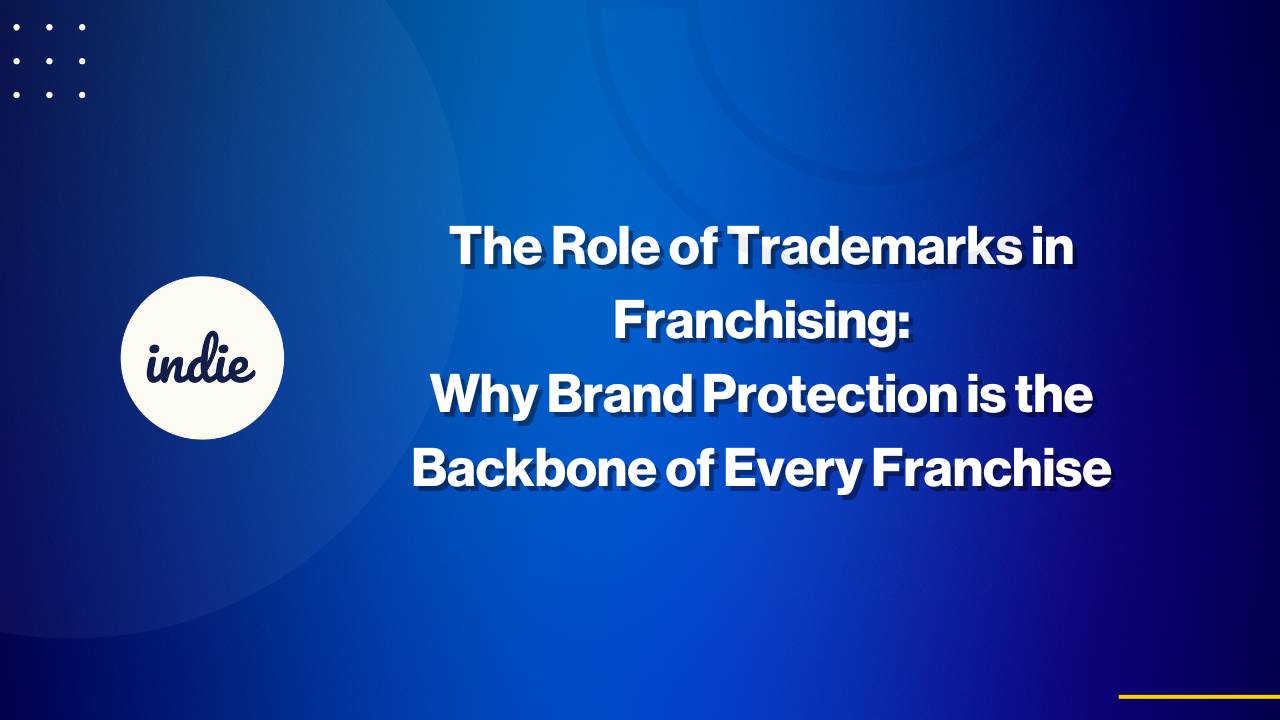So, let’s break it down: What role do trademarks play in franchising, and why should business owners especially those thinking about franchising care?
What Is a Trademark?
A trademark is a word, phrase, symbol, or design that identifies and distinguishes the source of a product or service. Think logos (like Nike’s swoosh), names (like Dunkin’), slogans (like ‚ÄúHave it your way‚Äù), and even color schemes or sounds.
The key function of a trademark is brand recognition. It helps customers know what they’re getting and who they’re getting it from.
What Is a Franchise?
A franchise is a business model where a company (the franchisor) licenses its brand, systems, and business methods to others (the franchisees). In return, franchisees typically pay fees and agree to follow certain rules to keep everything consistent.
At the heart of that agreement is the right to use the franchisor’s trademark.
Why Trademarks Matter in Franchising
1. They’re the Core Asset of the Brand
When someone buys a franchise, they’re not just getting training and support they’re buying into a recognizable brand name. That brand is what brings in customers, builds trust, and drives revenue.
If the franchisor doesn’t own the trademark or hasn’t registered it properly, the entire franchise system could fall apart.
2. They Protect Brand Consistency
Trademarks ensure that every location uses the same logos, colors, uniforms, signage, and packaging. This consistency creates a uniform customer experience, which is essential to maintaining trust across multiple locations.
Without trademark protection, anyone could start using similar branding, confusing customers and hurting the brand’s reputation.
3. They Give Legal Grounds for Enforcement
Let’s say a franchisee starts changing the name, logo, or customer experience. With a registered trademark, the franchisor can legally enforce brand standards, ensuring every franchise sticks to the rules.
Trademark law gives franchisors the power to:
- Send cease-and-desist letters
- Terminate franchise agreements
- Sue infringers, even outside the franchise system
How Trademarks Are Used in Franchise Agreements
A franchise agreement usually gives the franchisee a license to use the franchisor’s trademarks during the length of the agreement. But this use is limited and controlled.
Here’s what the agreement typically includes:
- Which trademarks can be used
- How they can be used (e.g., signs, ads, uniforms)
- When the rights expire
- What happens if the franchise is sold or closed
This ensures the trademark is not diluted or misused protecting both the franchisor and the other franchisees.
What Happens If There’s No Trademark?
If a franchisor doesn’t register their trademark:
- They risk losing control over their brand.
- Franchisees may use inconsistent branding, which confuses customers.
- Competitors or bad actors could steal or imitate the brand.
- Legal enforcement becomes much harder, especially in other states or countries.
According to the International Franchise Association (IFA), nearly 100% of franchises are built around registered trademarks it’s that important.
Real-World Example: Dunkin’ vs. Local Copycats
Dunkin’ Donuts (now just ‚ÄúDunkin’‚Äù) is famous for its strict brand rules. In the early 2000s, several franchisees tried to tweak their signs and menus to fit local tastes.
Dunkin’ responded by revoking franchise rights and filing trademark lawsuits. Why? Because brand consistency and control are key to franchise success and trademarks are the legal foundation for that control.
International Franchising and Trademark Issues
Expanding into other countries? Then trademark protection gets even more important.
Different countries have different trademark laws. Franchisors must:
- Register their trademarks in each country where they plan to expand
- Understand how local laws affect their brand usage
- Monitor for infringement abroad
Failing to register internationally could lead to “trademark squatting,” where someone else registers the brand locally and demands payment or blocks expansion.
Tips for Franchisors: How to Protect Your Trademark
If you’re thinking about franchising your business, here are key steps to take:
- Register Your Trademark Early
File with the U.S. Patent and Trademark Office (USPTO) before offering franchises. - Use Clear Brand Guidelines
Provide franchisees with a brand usage manual to keep things consistent. - Monitor and Enforce Usage
Regularly review how franchisees use the brand and take action when needed. - Register Internationally (if expanding)
Protect your trademarks in countries where you want to grow. - Work With a Trademark Attorney
Legal experts can help avoid mistakes and ensure your IP is fully protected.
Final Thoughts: Trademarks Are the Glue That Hold Franchises Together
In the world of franchising, your trademark is more than just a logo it’s the symbol of everything your brand stands for. It’s what customers trust, what franchisees invest in, and what the law uses to protect your business.
Without strong trademark protection, even the best business systems can fall apart. But with it, your franchise can grow, scale, and succeed one trusted location at a time.
Thinking of franchising? Start with your trademark. It’s your brand’s best defense and your franchise’s strongest asset.
Disclaimer: This article is for informational purposes only and does not constitute legal advice. Franchise and trademark laws vary by jurisdiction and situation. For personalized legal guidance, please consult a qualified attorney or reach out to Sleight Law directly.

